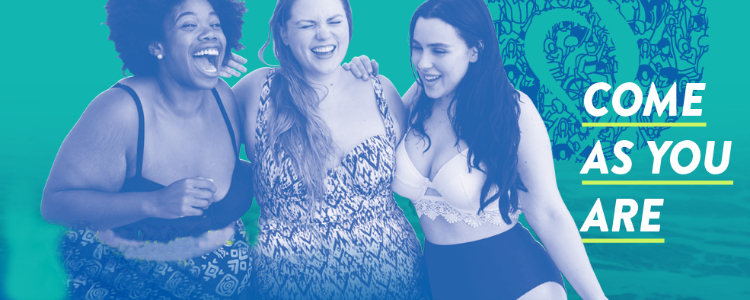Moving from Weight-Neutral to Body Affirming
Diet culture and fatphobia perpetuate eating disorders and can make full recovery impossible. They create an environment in which we, as the brilliant Deb Burgard has said, prescribe and encourage the same behaviors for fat people that we diagnose and treat as eating disordered in thin people (which also results in missing or even encouraging eating disorders in people of higher weight). The popularity of dangerous weight-loss medications and surgeries make it seem perfectly acceptable to risk a fat person’s life and quality of life in pursuit of thinness–which is not only dangerous for fat people, but also a dangerous message to send to those of any size who may have or may develop an eating disorder.
It’s difficult to believe your recovery is the most important thing when diet culture and a fatphobic world are telling you that the most important thing, by far, is being thin by any means necessary. And it’s difficult–if not impossible—to let go of your fear of being fat/gaining weight/having an “imperfect” body if you can plainly see you live in a culture where your fear is absolutely justified.
That is why we know that the Size Acceptance and Health at Every Size® paradigms are the only option that makes sense if we truly wish to prevent eating disorders and allow for full recovery.
This often takes the form of creating “weight-neutral” spaces, which includes no diet or weight loss talk, no negative body talk, no fashion magazines, no recommendations of weight loss as a cure for physical health issues or for stigma, etc. These are all important things that are critical in creating spaces that don’t perpetuate oppression or eating disorders. A weight-neutral space is a good start, but if we truly want to prevent eating disorders and create an environment that allows for full recovery, we need to move from weight-neutral to fiercely fat affirming.
It starts with doing our own work to uncover and fix internalized fatphobia. Asking ourselves tough questions like:
•What assumptions do I make about people in fat bodies?
•Would I be fine with my body if I became fat?
•Do I fall into “good fatty/bad fatty” thinking–thinking that fat people who perform “healthy habits” to my satisfaction deserve better treatment?
We live in a society that is rife with fatphobia, so if we find that we have adopted some of those beliefs it would not be a galloping shock. This isn’t about feeling guilty, it’s about doing the work so we can do better, challenging the beliefs we have that add to the oppression of fat people, and moving into thoughts and actions that support body liberation for those of all sizes. If you’re looking for support around this, check out organizations like Nalgona Positivity Pride, BeNourished, and The Body Positive.
While we work on ourselves, we must also work on our environments and practices. That means looking at the art on the walls, the magazines and books on the shelves, and the staff we hire, asking ourselves who is over-represented (hint: likely thin, white, cisgender, hetero and able-bodied appearing folks) and who is under- or completely un-represented (often those who are fat, of color, visibly queer, trans, non-binary, and/or disabled) and correcting that so anyone who comes into our space will sees themselves represented and feel welcome.
We need to make the physical space more affirming, including choosing offices in diverse neighborhoods, in accessible buildings with gender neutral bathrooms, and then working to create accessible, accommodating waiting areas and offices that include seating that is large and obviously sturdy.
We must change the ways that we practice to make sure that our self-work is translating into the best possible service to clients. This excellent paper by Hilary Kinavey and Carmen Cool provides important insights, and The Association for Size Diversity and Health (ASDAH) provides professional services to help.
Finally, we need to become body affirmation activists, committing to ourselves that diet culture and fatphobia (as well as racism, ableism, homophobia, transphobia, and other oppressions) won’t go unchallenged on our watch. We need to make sure that Size Acceptance and Health at Every Size® are disseminated, accepted, and practiced among our community, so that everyone of every size has a chance to prevent eating disorders, and everyone of every size who is struggling with an eating disorder has the opportunity to fully recover without facing challenges of fatphobia and diet culture within the eating disorders community.
Spaces that are fiercely fat affirming, including bodies of all sizes, give people an opportunity to love their bodies, see them as worthy of care, and know that whatever body they recover into will be affirmed and valued.
Ragen Chastain is a speaker, writer, activist, Certified Health Coach, and thought leader in the fields of Health at Every Size, Size Acceptance, and Corporate Wellness. Ragen has brought her captivating and motivating mix of humor and hard facts to stages including Google Headquarters, CalTech, and IvyQ. Author of the blog danceswithfat, the book Fat: The Owner’s Manual, and editor of the anthology The Politics of Size, Ragen is frequently featured as an expert in print, radio, television, and documentary film. Ragen is a three-time National dance champion, and two-time marathoner who holds the Guinness World Record for Heaviest Person to Complete a Marathon (Female,) and co-founded the Fit Fatties and the Fat Activism Conference. Ragen lives in LA, and is currently training for her first (and only!) IRONMAN Triathlon.
Author image by Lindley Ashline @sweetamaranth





